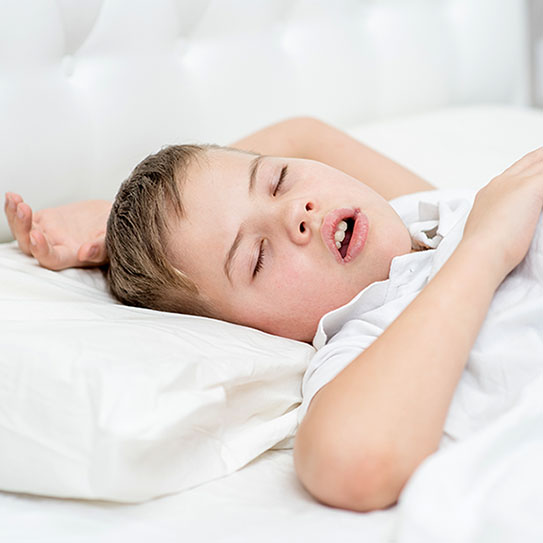BREATHING MAY FEEL automatic, but how you breathe can have a big impact on your health. While nasal breathing is the body’s natural and most efficient way to take in oxygen, many children and adults rely on mouth-breathing instead. This may happen occasionally during exercise or when congested, but chronic mouth-breathing can cause surprising effects on both oral health and overall well-being.
Dry Mouth
When you breathe through your mouth, saliva production decreases, leading to dry mouth. Saliva plays an important role in protecting teeth by washing away food particles and neutralizing acids. Without it, you’re at greater risk for cavities, gum disease, and bad breath.
Changes in Jaw and Facial Development
In children, chronic mouth-breathing can affect the way the jaw and face develop. Mouth-breathers often hold their tongues lower in the mouth instead of pressing against the palate. This can lead to a narrower upper jaw, a high-arched palate, and dental crowding. Over time, these changes may also influence facial appearance, often resulting in a longer, narrower facial structure.
Orthodontic Problems
Because of the way mouth-breathing affects jaw development and tongue posture, it often contributes to bite issues such as overbites, open bites, or crossbites. These problems can make it harder to chew properly and may require orthodontic treatment to correct.
Gum Irritation
Constant airflow across the gums can cause them to become dry, irritated, or inflamed. Combined with the higher risk of plaque buildup, this increases the chance of gingivitis or more serious gum disease.
Effects Beyond the Mouth
The consequences of mouth-breathing aren’t limited to oral health. People who breathe through their mouths regularly may also experience:
- Sleep Issues: Mouth-breathing during sleep is often linked to snoring and sleep-disordered breathing, including obstructive sleep apnea. Poor sleep quality can affect focus, behavior, and overall health.
- Low Oxygen Intake: Nasal breathing filters and humidifies the air, while also regulating airflow. Mouth-breathing bypasses these benefits, which can leave you feeling less rested and less energized.
- Speech Concerns in Children: Kids who mouth-breathe frequently may develop difficulties pronouncing certain sounds, as changes in tongue position and oral structures can affect speech development.
What Causes Mouth-Breathing?
Common causes of chronic mouth-breathing include nasal congestion, allergies, enlarged tonsils or adenoids, chronic sinus infections, or structural issues like a deviated septum. Sometimes, it becomes a habit even after the original cause is resolved.
Helping Kids and Adults Break the Habit
If you notice that you or your child often breathes through the mouth, it’s important to address it early. A dentist or pediatric dentist can check for signs of mouth-breathing during exams, such as dry gums, crowding, or an arched palate. Depending on the cause, treatment may include:
- Referral to an ENT specialist to address airway blockages.
- Orthodontic treatment to correct jaw development issues.
- Breathing exercises to encourage nasal breathing.
- Preventive care to protect teeth and gums from the effects of dry mouth.
Breathe Better, Smile Brighter
Mouth-breathing may seem harmless, but its effects on oral health and overall well-being can be significant. By recognizing the signs and seeking help early, you can protect your teeth, improve sleep quality, and support healthier development in children. If you suspect chronic mouth-breathing, talk with your dentist about solutions that will help restore healthy breathing and protect your smile for the long run.

